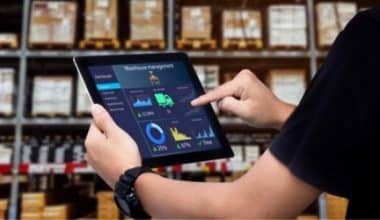The data-driven nature of today’s fast-paced business world is growing. Modern businesses use big data to streamline their decision-making procedures, increase operational effectiveness, and take decisive action to boost sales and profitability. To obtain those advantages, a business needs to investigate and spend money on a reliable data management platform (DMP). Given the size of the enterprise software market, many businesses find it difficult to select the solutions that would best support their objectives. In this post, we’ll analyze the top Master Cloud and Customer Data Management Platforms for this year and give you additional details about which data management platform is right for your company.
What is a Data Management Platform (DMP)?
An integrated digital tool or platform known as a DMP enables companies to gather, manage, and analyze data for business intelligence (BI) objectives. Big data analytics and artificial intelligence (AI) technologies are the driving forces behind many DMPs. DMPs keep track of consumer data, demographics, and mobile identifiers like cookie IDs that give companies granular insights into their target markets.
The DMP market is crucial to the digital marketing sector. It would be difficult for marketers to customize adverts to their current and potential clients without a DMP to organize customer data.
Important Components of a Data Management Platform in 2023
Centralizing data so it can be used throughout an organization is one of the finest benefits of a DMP, but it should also include other crucial features that benefit its users.
Make that your data management platform includes these five essential features:
#1. Increasing audience
A company’s audience is made up of people who have a similar identity, and audience creation is one of the key activities in a DMP that allows marketers to pinpoint the correct demographic segments to target and connect with them through a successful campaign.
#2. Audience research
Once a marketing team starts campaigns targeted at certain populations, it must track the results, which may entail figuring out what aspects were successful, what needed improvement, or which devices generated the most conversions.
#3. Advertising data integration
DMPs that accomplish this essentially create a data marketplace for the user, which can help marketers increase the company’s audience reach, must have an advertising data integration feature that assembles and uses information gathered from various sources and transforms it into targetable segments.
#4. Device-crossing targeting
DMPs allow marketers to construct tailored marketing campaigns to distribute across a user’s devices for a seamless ad experience. It is commonly known that marketers are responsible for monitoring numerous marketing channels and comprehending customer data from each one.
#5. High-tech security
DMPs must incorporate the finest security procedures to safeguard their users and sensitive data like any digital data-oriented tool. Breaches are happening more frequently every year, putting customer data and company assets in greater danger.
Best Data Management Platform
Selecting the right DMP can seem intimidating, but taking the time to research DMPs and how they stack up against each other will help make the decision easier. After reading the definition of a data Management Platform and learning what critical features it should include, you may be wondering which DMPs and systems are best suited for your company.
Below is a list of customer Data Management Platform examples you should consider using in 2023.
#1. Adobe Audience Manager
Adobe Audience Manager is a complete and transparent DMP that leverages a machine learning (ML) and AI architecture called Adobe Sensei. Also, Adobe is one of the most well-known and extensively used software firms. It provides a DMP that offers numerous features and benefits for organizations. This DMP interfaces with other third-party programs and is a component of the Adobe Experience Cloud technology stack.
#2. Amobee
Amobee presents itself as a stand-alone ad network. It has several DMP capabilities and allows full-cycle administration of campaigns and portfolios. As it offers audience intelligence, data onboarding, segment building, sentiment, and trends, the Amobee Discover tool is quite helpful. When employing Amobee, businesses also gain from media planning, execution, optimization, and analysis.
#3. Audience Studio by Salesforce
In terms of customer relationship management (CRM) software, Salesforce is the best. Audience Studio, formerly known as Salesforce DMP, is a DMP that the company also offers and that combines and collects data from many sources to produce insights that can be utilized to tailor advertising campaigns.
#4. Google Marketing Platform
It is hardly surprising that Google, one of the major players in Big Tech, is interested in the DMP market. The Google Marketing Platform, sometimes referred to as Google’s DMP, offers small- and large-business solutions. Flexible scaling, greater data analytics, automation, connection, and expanded capabilities for video campaigns are some of the primary advantages of Google’s DMP.
#5. Lotame
Publishers, marketers, and agencies can unlock the value of their audience data with the help of the Lotame DMP. It is regarded as a targeting tool that can gather consumer data from all devices. This aids marketers in adjusting their plans to produce more successful, effective campaigns.
#6. Nielsen DMP
The important part Nielsen plays in television is well-known. It now provides a cloud-based solution to aid businesses in smart and efficient marketing. Utilizing several sorts of data, Nielsen’s DMP is a seamless media-buying platform that creates a comprehensive picture of client activity. Audience segmentation, message sequencing, media planning, profiling, orchestration, frequency capping, and other characteristics are a few of the capabilities available.
#7. OnAudience
Employing OnAudience will help businesses better understand their audience groups, implement efficient, focused advertising campaigns, and possibly boost return on investment (ROI). With OnAudience’s DMP, users can easily evaluate consumer information from online profiles and have different reports generated automatically.
#8. Oracle BlueKai DMP
The top DMP in the sector, BlueKai assists businesses in targeting the right audiences with their mobile, web, and offline advertising. Business professionals may learn about the stages of the customer journey from Oracle BlueKai, as well as how to target the right customers on the right platforms and at the correct stages of the trip.
Customer Data Management Platform
A customer data management platform (CDMP) gathers data from online and offline sources and standardizes it to build thorough client profiles. The advertising and customer experiences that are created using these profiles are then utilized to draw in and keep high-value consumers. To assist you in choosing the best customer data management platform for your needs, we’ve done the necessary research.
The Best Customer Data Management Platforms of 2023
#1. Segment
The Segment Free plan allows customers to track 1,000 users monthly, collect data from two sources, distribute data to an unlimited number of recipients (such as analytics tools and platforms), and construct a single customer profile. You can track 10,000 visits every month from unlimited sources with its Team plan, which costs $120 per month. Advanced features like roles and permissions and customized customer experiences are available in its Business plan, which calls for a unique quote.
#2. Emarsys
Using a comprehensive perspective of every consumer, Emarsys primarily functions as a marketing customer data management platform. Its main objective is to compile data and provide businesses with insights for personalized consumer interactions that boost sales. The capacity to integrate an infinite number of online and offline channels, such as direct mail, the web, SMS, mobile apps, digital marketing, email, and more is combined with this data consolidation.
#3. Optimove
The primary goal of Optimove’s cloud-based CDP is to gather data into a 360-degree customer picture for use in understanding customers and optimizing marketing campaigns. It gathers information from first-party raw data, customer behavior on websites and mobile apps, third-party information, and campaign response analytics. The next section provides information on future client preferences and suggests proactive responses from businesses.
#4. FirstHive
FirstHive’s customer data platform (CDP) enables marketers to use its insights to develop tailored marketing campaigns by combining first-party data from online and offline sources. Its decision engine also gains knowledge from your data and makes recommendations on how to interact personally with customers. Additionally, you may build real-time tailored communication across channels using rules-based actions.
#5. Lytics
Lytics is a platform for customer management data that concentrates on enhancing the marketing and advertising capabilities of brands. To automate ad and marketing targeting, it first provides unified and comprehensive client profiles. Leveraging audience segmentation to generate highly tailored and real-time methods, ultimately helps organizations raise email open rates, produce larger ad returns, and improve customer conversion rates.
Cloud Data Management Platform
A technology system known as a cloud data management platform (CDMP) enables businesses to store, process, and manage data across various cloud environments. Regardless of where the data is stored, a CDMP offers a centralized data management system that can be accessed by several users and applications.
A cloud data management platform may include the following important characteristics:
- Data integration: A CDMP can combine data from several sources, including databases, data warehouses, and cloud-based applications.
- Data processing: A CDMP can use technologies like ETL (extract, transform, load), ELT (extract, load, transform), and data streaming to process data in real-time or in batches.
- Data governance: Policies relating to data quality, security, and compliance may be enforced by a CDMP.
- Data analytics: A CDMP enables users to learn from their data by facilitating data analytics and visualization.
- Data storage: A CDMP can archive structured, semi-structured, and unstructured data in a variety of formats.
An organization’s ability to manage its data in the cloud is often made possible by a cloud data management platform, which is scalable and adaptable. It can assist businesses in cutting expenses, increasing productivity, and learning from their data.
Best Cloud Data Management Platform
There are several well-known cloud data management platforms (CDMPs) on the market, each with a special assortment of features and functionalities. Here are a few examples:
#1. Amazon Web Services (AWS)
Object storage service Amazon S3, relational database service Amazon RDS, and data warehousing service Amazon Redshift are just a few of the cloud data management services provided by AWS.
#2. Microsoft Azure
Azure offers a variety of services for data management, such as Azure Blob Storage for object storage, Azure SQL Database for relational databases, and Azure Data Lake Storage for big data and analytics.
#3. Google Cloud Platform (GCP)
GCP provides several services for managing data in the cloud, such as BigQuery for big data and analytics, Google Cloud Storage for object storage, and Google Cloud SQL for relational databases.
#4. Snowflake
With the help of the cloud-based data warehouse platform Snowflake, businesses can store and utilize massive volumes of data in a scalable and adaptable manner.
#5. Databricks
Databricks offers a cloud-based platform for data engineering, data science, and analytics, with tools for data integration, processing, and machine learning.
In general, your organization’s specific demands, such as the kind of data you need to manage, the degree of scalability needed, and the available budget, will determine which Cloud data management platform you should use.
Master Data Management Platform
The practice of managing and maintaining a single, consistent picture of an organization’s essential data entities, such as customers, goods, suppliers, and staff, is known as master data management (MDM). A technology solution known as a master data management platform (MDMP) enables enterprises to produce, manage, and control master data across numerous systems and applications.
#1. Talend Data Fabric
To enable both IT and business users to contribute to the creation of a healthy data environment, Talend Data Fabric offers a single, secure point of management for data in addition to delivering profiling, enrichment, validation, and stewardship capabilities in a unified user interface.
#2. SAS Viya
SAS Viya, a cloud-native AI, analytics, and master data management platform, enables you to scale cost-effectively, boost productivity, and innovate more quickly with the support of trust and transparency. Through the usage of Viya, teams, and technology may be combined to successfully collaborate among all users.
#3. Adverity
With the help of the adaptable end-to-end master data management platform Adverity, data-driven marketers can increase performance across all campaigns and channels and make better decisions. Finding chances to increase income and show marketing ROI is simple with Adverity.
#4. Semarchy xDM
The Intelligent Data Hub is the brainchild of Semarchy. Enterprise Master Data Management (MDM) is a problem that our xDM platform solves for some of the most recognizable brands in the US and Europe. This agile platform makes use of clever algorithms and material design to streamline processes, data stewardship, quality, and enrichment all at once.
#5. CloverDX
The CloverDX Data Management Platform offers a reliable platform for data transfer, transformation, and automation for complicated data difficulties. By automating processes, freeing up developer time, and addressing data concerns from A to Z inside a single platform, CloverDX helps businesses to lower the cost of acquiring access to data and enhance data quality.
Who Uses Data Management Platforms?
Ad agencies, advertisers, and publishers utilize DMPs to build rich, personalized data sets and more precisely target individuals for online ads.
Is SQL a Data Management Platform?
No. SQL (Structured Query Language) is a computer language that is frequently used to manage and manipulate data in relational databases, not a platform for data management per se. SQL is a crucial tool for managing and analyzing data since it can be used to create, edit, and query databases.
What Are the 4 Types of Data Management Systems?
- Customer Relationship Management System or CRM
- Marketing technology systems
- Data Warehouse systems
- Analytics tools.
Why Do I Need a Data Management Platform?
In essence, a DMP is a potent tool that aids in managing all the data you gather, both online and offline, to use it mostly for marketing initiatives.
What Is the Difference Between Data Management and Data Platform?
Although the terms “data management” and “data platform” are linked, they refer to various facets of data management. In other words, a data platform is a technological solution that makes it possible to manage data, but data management is a larger notion that includes all aspects of managing data.
Data management is the process of using a data platform’s tools and services to efficiently manage data, whereas a data platform may be thought of as a collection of tools and services that support data management.
Is Google a Dmp?
Google offers various tools and solutions that can be used for data management, although it is not commonly regarded as a data management platform (DMP).
Conclusion
A company can gather, store, process, and manage massive amounts of data from several sources using a data management platform (DMP), which is a technological solution. A DMP offers a central location for data management and storage and comes equipped with tools for processing, analyzing, and visualizing data.
There are several well-known DMPs on the market, each with a special set of features and abilities. The selection of a DMP will be based on the particular requirements of your firm, including the kind of data you must manage, the degree of scalability required, and the available budget.
Related Articles
- WHAT IS BIG DATA: Definition, How It Works & Why It Matters
- Top 15 Best Data Recovery Services (2023 Review)
- DATA SCIENTIST SALARY: Average Data Scientists Pay 2023
- WHAT IS MEDIA MANAGEMENT: All to Know
- SURVEY APP: Top Best Survey Apps for Your Business 2023
- BUSINESS CONSULTING FIRMS: Top Consulting Firms of 2023






